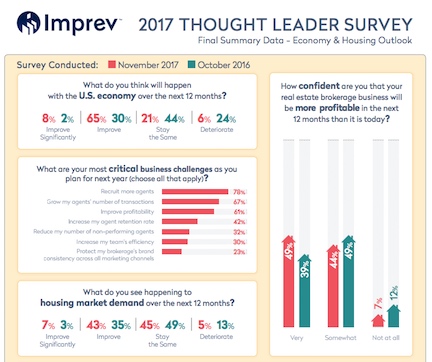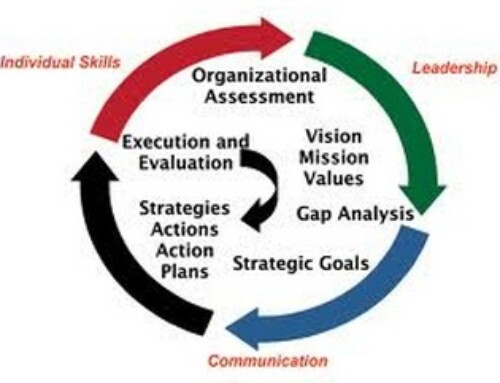 An unprecedented 73% of top real estate executives say the U.S. economy will improve or improve significantly. That’s the highest level of confidence real estate leaders have expressed since Imprev started its annual Thought Leader Economy & Housing Outlook Study in 2012.
An unprecedented 73% of top real estate executives say the U.S. economy will improve or improve significantly. That’s the highest level of confidence real estate leaders have expressed since Imprev started its annual Thought Leader Economy & Housing Outlook Study in 2012.
These numbers are simply stunning. Top real estate executives’ confidence in America’s economy has more than doubled since October 2016. Then just 32% said the U.S. economy would improve or improve significantly. The 2016 survey was conducted immediately prior to the U.S. presidential election. The highest confidence level prior to the current study was 54% in 2012.
The biggest surprise in the survey data: for the first time, it broke the “closer to home” trend. Every year, the Imprev Thought Leader Survey asked top real estate leaders about their confidence in the economy, the broke it down: local economy, state economy, U.S. economy and World economy.
And every single year, the same results: real estate leaders expressed the most confidence in the local economy, second most confidence in the state economy, third most confidence in the U.S. economy, and the least confidence in the World economy. It made sense: one has more influence and knowledge about one’s local economy, so naturally, the closer to home the economy, the greater the confidence.
Except when it’s not: As in 2018.
That’s right. This year, for the first time, real estate leaders expressed the most confidence in the U.S. economy. That has never happened before. To give you an idea of the typical contrast, Renwick Congdon, CEO of Imprev and father of the Thought Leader Survey, says, “Take 2013 for example: 46% of real estate leaders were more confident in their local economy, 39% were more confident in their state economy and 21% were confident in the U.S. economy.”
This year’s confidence levels, says Congdon, “Leaders were more confident in the U.S. economy (56%) than either their own local economy (49%) or their own state’s economy (40%).” Call me stunned.
Real estate leaders confidence in Housing was equally bullish and at record levels as well. Overall, half of real estate executives said that the housing market will improve or improve significantly this year—a large jump from last year’s 38%. Housing confidence levels for the coming year had steadily dropped from 2012 to 2016.
Broker challenges
Wisely, Imprev also asks real estate leaders heading into the New Year to reflect on their top business challenges. As years past – no surprise here – recruiting remains at the forefront, with 78% of leaders citing it as their top business challenge. It is interesting to note that although it still ranks number one, it’s not as dominant as it once was with 86% in 2015 and 85% in 2016. Leaders are also focused on growing the number of transactions per agents, selected by more than two-in-three (67%).
Brokerages’ third top business challenge is improving profitability, ranked at 62%. Profitability is a top challenge that study respondents feel very optimistic they can address this year. Remarkably, almost half (49%) of respondents—the highest ever in this study—say they are very confident that their brokerage will be more profitable in 2018. That number is up significantly from last year, when it was 39%.
The one downside
The one thing in the survey that always leaves me a bit depressed and there is no blame whatsoever with Imprev because it’s a demographic that unfortunately is representative of our industry: 70% of the participants were male and 30% are female. When you know that the profile of the typical Realtor in America is female and that there are more female Realtors than male Realtors, then you hunger for gender equality when you see a stark contrast number like this. Fortunately, efforts are underway in our industry to address that gap, and that’s a great topic for another story.
Free download
Thankfully, the good folks at Imprev have created a fantastic report with the full Imprev Thought Leader Economy & Housing Outlook Study results, you can get at this link, for free www.imprev.com/2018-outlook.




